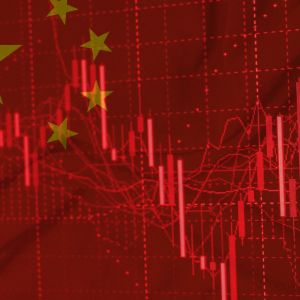Stocks faltered in China on Friday on low investor sentiment due to trade uncertainty following a lack of progress between Beijing and Washington on the tariff talks. The US President Donald Trump revealed on Thursday that they were engaged in trade talks with China, but did not give evidence of any progress. Additionally, the Trump administration has shaken up trade waters with another announcement to introduce new fees on Chinese vessels, escalating the geopolitical tensions between the two. US measures touch markets in China in ‘a difficult spot’ According to local reports , the US’ move is also further clouding the growth outlook. While the US could strain the Chinese logistics industry, it is also hurting the markets in many ways. Stocks tumbled on Friday with the Shanghai Composite Index closing 0.1% lower as it reversed the weekly gains to 1.2%. The CSI 300 was little changed while Hong Kong’s market was closed for a public holiday on Friday. According to SCMP, most of the country’s biggest companies traded lower on Friday, with liquor maker Moutai, slowing by 0.3% to 1,565.94 yuan. Coal producer China Shenhua Energy went down 0.2% to 39.20 yuan while electric vehicle manufacturer BYD let up by 1.1% to 346 yuan. Zhejiang Dingli Machinery saw its stock fall 8.6% after it reported a 13% decline in net profit last year, despite a 24% boost in operating income. In the meantime, Shaanxi Energy Investment suffered a 29% drop in its Q1 profits, further highlighting the ongoing challenges in the energy sector. Volatility in China to send ripples across global markets To worsen an already shaky relationship between the two countries, the US Trade Representative’s Office announced that Chinese-owned or Chinese-built ships will now be required to pay fees for docking at US ports. Charges are also expected to increase based on the vessel’s size and cargo. According to the SCMP, a second phase which is due to take effect in three years, will gradually limit the amount of liquefied natural gas (LNG) that foreign vessels can transport. The increasingly tough rules are phased in to boost American shipbuilding. And while the two powerhouses fight, industries across the globe, including manufacturing and energy, brace themselves for the potential impacts, which will most likely result in reshaped trade alliances and market strategies. The effects are already being felt on stock markets. “Confrontation is still the main theme of China-US trade war and there’ll be lots of back and forth,” said Dongxing Securities analyst Lin Yang. “External factors still constitute the biggest uncertainty facing the market. The market is likely to trade sideways until the dust settles.” According to Finimize , the new port fees could worsen the volatility in Chinese logistics and trade stocks, sending waves across global markets. Investors are also closely watching the trade developments, weighing their effects on shipping costs and supply chain dynamics. As for Chinese stocks, they have been resilient even after the US rolled out tariffs on global trading partners this month. According to SCMP, several state-backed investment banks have intervened in the market to prop up stocks. Meanwhile, expectations are that China will introduce more forceful stimulus measures to boost domestic demand and offset the negative impact of the 145% tariff imposed by the US. Elsewhere, in Asia-Pacific, Nikkei 225 in Japan rose by 1% while South Korea’s Kospi added 0.5%. In Australia, markets were closed for a public holiday. Cryptopolitan Academy: Tired of market swings? Learn how DeFi can help you build steady passive income. Register Now


















